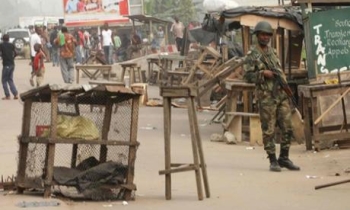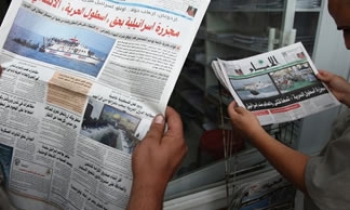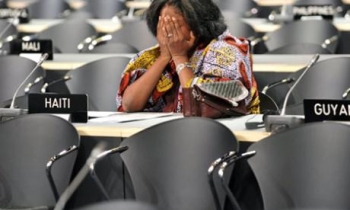NEW YORK: As journalists scramble in and around Beirut and southern Lebanon to cover the escalating violence between Israel and Hezbollah, several veterans of recent Baghdad reporting say the violence in Iraq is, in many ways, more dangerous to reporters than what they are encountering in the newly war-torn Lebanon.
In conversatons with E&P today, they also described day to day working conditions that make their work a little easier than certain aspects in Iraq, with fewer logistical problems or electricity and phone connection interference. Not to mention Hezbollah's willingness to work with reporters, to a degree, in an effort to get their message out.
"Electricity is sporadic in and out, but it is almost uninterrupted," said Hannah Allam, former Baghdad bureau chief for Knight Ridder, now head of McClatchy's Cairo bureau who has been in Beirut in recent days. Saying she had recently traveled south to several Hezbollah areas, she said its leaders have been willing to speak with reporters and allow them to report. "I have not felt censorship from any side," she said.
Liz Sly of the Chicago Tribune agreed. "They are pretty elusive, but not hostile or aggressive," she said of Hezbollah. "If you organize through their officials, they are not averse to meeting journalists and putting across their point of view."
Both Allam and Sly noted that the first journalist to die, a Lebanese photographer whose taxi was struck by an incoming bomb, was killed Sunday, adding to the obvious safety concerns. They also acknowledged that bridges remain a target, so reporters seek to avoid them or cross quickly. "Several southern suburbs of Beirut have been almost completely wiped out," Allam said, during a phone call from the Beirut hotel where she, Sly, and other western journalists are staying. "A tangle of wires, rubble and uninhabitable buildings."
She also said that the local English-language paper, The Daily Star, had been hit by a newsprint shortage, reducing the number of daily pages, while many of its reporters must work from home.
Lebanon's leader Fouad Siniora angrily described the damage to his country on Monday, including about 380 people killed and some 750,000 displaced, and, according to a statement released by his office, said the Israeli bombing had set Lebanon back “50 years.”
Although the continued Israeli attacks on Lebanon, mostly in the southern suburbs, are an obvious threat to life and property -- often coming without warning -- the city remains safer overall and, in many ways, more welcoming to journalists than the atmosphere in Baghdad.
"Baghdad is still a lot more dangerous than Lebanon for foreigners," said Sly, the Tribune reporter who arrived in Beirut 10 days ago after her most recent eight-week stint in Baghdad. "We are still personally targeted [in Baghdad]. They can snatch you. In Baghdad, you have to hide the fact that you are a foreigner. I only go around with my trusted staff there."
Sly, who has reported from Iraq on and off for two years, says the ongoing threat of Israel attacks is a danger. But compared to being in Baghdad, the Beirut city life remains devoid of other dangers, from kidnapping to car bombs, that still pervade Baghdad. "If you are under an Israeli war plane, it is extremely dangerous," she acknowledged. "But they are not randomly bombing the city."
Allam agrees. "In Baghdad, you worry about the car next to you blowing up, here you worry about a bomb hitting you from the sky," Allam said. "Where the danger comes from is different. ... I don't feel any threat from Hezbollah. Nobody is worrying about kidnappings, but we know that can change at any moment."
Thanassis Cambanis, a Boston Globe reporter who covered Iraq for three years before being reassigned last March, also noted the different dangers in Lebanon, where he is reporting from Tyre. But he declined to say which location is more dangerous, noting that, in Baghdad, you can take more precautions to avoid kidnappings and car bombs, compared to Lebanon, where bombs can strike anywhere.
"There is more immediate threat of being blown up here by a bomb," Cambanis said. "In Iraq, there are precautions you can take as far as security or trying to blend in or take different routes. I feel like I have a lot less control [in Lebanon]." Israeli jets have bombed Red Cross ambulances near Tyre in recent days, killing several occupants.
In Israel, meanwhile, Dion Nissenbaum, McClatchy's Jerusalem bureau chief for the past year, says reporters are not in as much danger, and have actually been getting as close to the front lines as they want. "We have had better access to the front lines than we expected," he told E&P Monday. "The day of the [Israeli soldier] kidnapping, I was able to drive right up to the border and talk to members of the Israel artillery battery and talk to tank commanders."
Access is one step below that of embedding, Nissenbaum said, adding that although the Israeli Army embedded some Israeli journalists last year during its pullout of Gaza, he did not see it occurring again soon.
Nissenbaum said reporters have even gotten close enough to the front lines to actually catch the Israeli military in a bit of an exaggeration, when they announced they had taken a Lebanese town. "We were standing on a hilltop overlooking the valley and it was clear they hadn't," Nissenbaum said of the city that was eventually captured.
A former embed in Iraq, who also covered Baghdad as a unilateral, Nissenbaum agreed that Iraq was more dangerous than this fighting. But, he stressed, "I am not in Lebanon."
Joe Strupp (jstrupp@editorandpublisher.com) is a senior editor at E&P.









